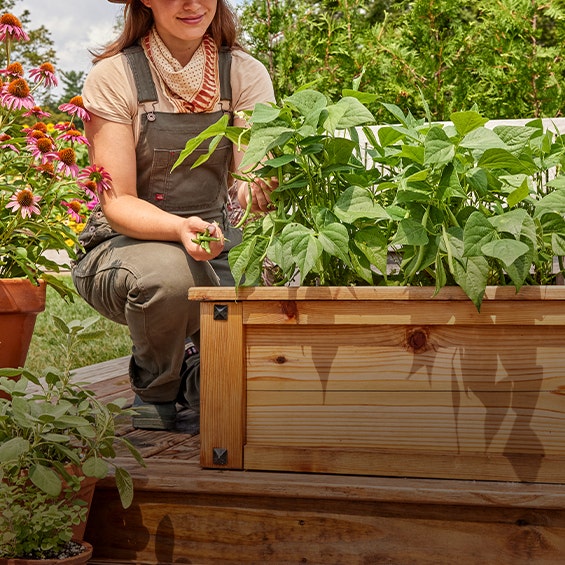


Once you've carefully sown your seeds and watched green shoots push their way to the surface, you quickly start longing for bouquets and bowls of fresh produce. For many new gardeners, the biggest question during the long wait to flowers or harvest is, "How often should I water my garden?"
The need for watering your garden varies greatly depending on soil, local climate and the daily weather. Ideally, Mother Nature takes care of watering with gentle rains. Realistically, you may have to help. You also need to watch for signs of overwatering plants.
Here are our best tips for watering your plants like a pro — even if you're just starting out.
How Often Should I Water My Garden?
You need about an inch of water a week for gardens planted in the ground. This will give you a good baseline for weekly watering. Giving them a light surface watering every night or every other night isn't as healthy as a thorough weekly watering, which encourages roots to grow deeper rather than shallow. Longer roots anchor the plant better while allowing it to reach more moisture and nutrients below the surface.
If you need confirmation of how well you're watering, you can use a rain gauge to measure the amount of water your garden is getting. You can also stick your finger or a spade into the ground to see if moisture is reaching 4 to 6 inches deep.
How Often Should I Water Container Gardens?
Since container gardens are smaller, they'll dry out faster than a full garden bed. During heat waves, they may need daily watering depending on how dry the soil feels. Choose potting soil that contains coconut coir or other organic ingredients to help hold moisture and keep water from evaporating quickly.
It's also important to make sure your pot has good drainage holes that aren't blocked to prevent your plants from drowning after a summer downpour.
If you have a small garden, you can also try self-watering containers.
What Time of Day Should I Water My Plants?
The best time of day is in the morning — usually before 10 a.m. — before the sun hits its full strength. The cooler morning temperatures ensure the water soaks into the soil instead of evaporating in the evening after the ground has soaked up the day's heat. The warm daytime air can also dry off any leaves, vegetables or fruit that got wet. Wetness can lead to mildew or mold. The second-best time to water is early evening.
What Should I Use for Watering?
If you prefer using a watering can, look for one that's comfortable to carry and has a long spout you can direct to the base of your plants. Don't water from above if you can avoid it.
Watering wands, which attach to hoses, can make watering multiple containers and gardens easier. They're also handy for reaching up to hanging plants and reaching deeper into a garden and beneath your plants' leaves and produce.
When using a water wand with different settings, choose the gentle shower to soak the soil without splattering water onto leaves and other plants, which can spread soil-borne disease or fungus. Save the high-powered jet setting for cleaning pollen off your car or mud off your boots.
To avoid the hassle of a kinked hose, look for coiled hoses or set up soaker hoses with a timer for less hassle and potentially hands-off watering. Soaker hoses can snake through your garden to keep a gentle flow of water near the base of plants.
What Are the Signs of Overwatering and Underwatering?
You may see your plants wilt during the peak midday heat, but they should bounce back as the day cools. If not, check the soil. If it feels dry past your first or second knuckle, you may need to add another watering session if the weather has been dry and hot.
Overwatering can also trigger wilting as roots get waterlogged. Feel the soil to see whether it's wet and soggy or nicely moist. If leaves are beginning to turn yellow or if blisters or spots are appearing on leaves, stop watering and let overwatered plants recover. If a plant has fruit, such as cherry tomatoes, it may start to crack with too much water.
How Can I Prevent Overwatering?
If you're still struggling with how often you should water your garden and feel like you're underwatering or overwatering, an electronic soil moisture meter can help. These inexpensive tools use prongs that can test moisture, soil pH and even sunlight to help you troubleshoot why your plants aren't thriving.
How Can I Conserve Water?
If you live in a dry area of the country and need to conserve resources or restrict your water use, it can be difficult to make sure your plants get enough water. To help conserve water, make sure your garden has enough compost or organic material in your soil that allows it to both drain well and hold water in between watering days. You can also add a layer of mulch around your plants to help keep moisture from evaporating.
A healthy, bountiful garden begins with the right amount of water. Keep checking up on your garden and potted plants throughout the season to make sure they're getting enough, but not too much, water.
Starting with the right watering tools when it comes to keeping your garden watered makes a big difference in your garden's happiness and health.



